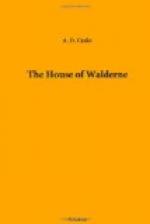“What food hast thou?”
“Yet half a loaf, and a cruse nearly filled with water.”
“It is all thou mayst get till my lord return. He has taken the keys. Use it sparingly.”
For a moment there was silence, then a calm voice replied:
“He who fed Elijah by the ministry of the ravens will not fail me.”
“But if Sir Drogo be absent many days thou mayst starve.”
“Though he slay me, yet will I put my trust in him.”
“I do believe he will be saved, by a miracle if needs be,” muttered the man. “The saints will never let him starve, he is one of them.”
The second day passed, and Martin’s bread and cruse yet held out. But his gaoler was very uneasy, and wandered about the dark passages like a restless spirit. Neither could he help breathing his despair to Martin, as hours passed away and no messenger returned from Drogo with the key.
But the answer from the captive was always full of hope.
“Be of good cheer, for there has been with me an angel of God, who has assured me that the tyranny will soon be overpast. Meanwhile I feel not the pangs of hunger.”
The fourth day from the departure of the royal army arrived. No one had as yet brought back the key. It was a day of awful suspense, for although no sound of artillery announced the awful strife, yet it was generally known that a battle was imminent, and was probably going on at that moment. They sent two messengers out at dawn of day, and one returned at eventide, breathless and sore from long running.
He had been on that group of downs which lies eastward of Lewes, of which Mount Caburn is the highest point, and from which Walderne Castle was visible. There they had raised a beacon fire, and he had left his comrade to fire it in case the king lost the battle. But ere he departed he had seen, as he thought, the royal array in hopeless confusion.
The afternoon brought another messenger, who confirmed the evil tidings, but was in hope that the prince, yet undefeated and then rampaging on the hill amongst the baggage, might retrieve the fortune of the day. When sunset drew nigh many of the garrison of Walderne betook themselves to the elevation on which the church is placed, whence they could see the Castle of Lewes through an opening, and watched, fearing to see the bale fire blaze, which should bid them all flee for their lives, unless they were prepared to defend the castle, to be a refuge in case their lord might survive and come to find shelter amongst them.
On this point there were diverse opinions. A waggon had gone out in the early morning to collect forage and provisions by way of blackmail—at this moment it was seen approaching the gateway below.
The sun had set, and the shades of evening were falling fast. All at once a single voice cried, “Look! the fire!” and the speaker pointed with his finger.
The eyes of all present followed his gesture, and they saw a bright spot of light arise on the summit of the downs, distant some twelve miles.




